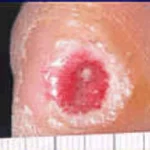
Why do Occupational Therapist need to know about wound care?
Hand therapists get patients either the same day or at times a few days after surgery. To provide comprehensive care, therapists must have the knowledge of management of wounds to ensure fast recovery. Therapists must be and extension for the surgeons to help remove sutures when closed to start scar massage as soon as the wound is healed rather than wait on the surgeon to remove the sutures.
Wound care or integumentary, is one of our four practice patterns. The integumentary system is not an area that people typically associate with hand therapy. Usually, they think of neuromuscular or musculoskeletal disorders as what therapists treat, not wound care. Wound Management is very an important aspect of Hand Therapy and therapist need to keep their skills abreast with the latest in wound care. Currently, we do not have a certification just for wound care in the Hand Therapy like certifications in neuro, orthopedics, pediatrics, etc.
Having knowledge of basic wound care and some basic dressings and treatment will enable the therapist to provide effective therapy. Even if you don’t choose to specialize in wound care, it’s important to have a basic understanding. For example, you may see someone in an outpatient setting who has a non-healing incision after a flexor tendon repair, you may be the first person to identify that there is a problem with the wound healing.
If you’re in a rehab, or acute care, or long-term care setting, you may have patients with pressure injuries or other types of wounds that, again, you might not be the individual taking care of those wounds, but you need to be able to identify them and give other members of the healthcare team the heads up that those wounds are present.
